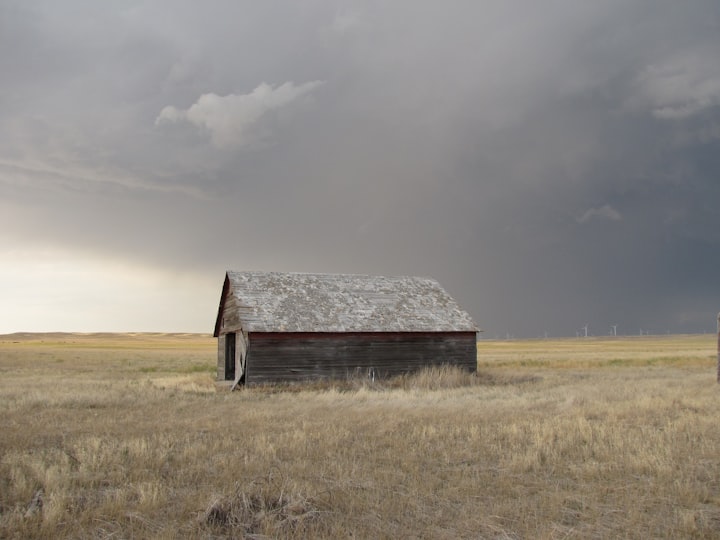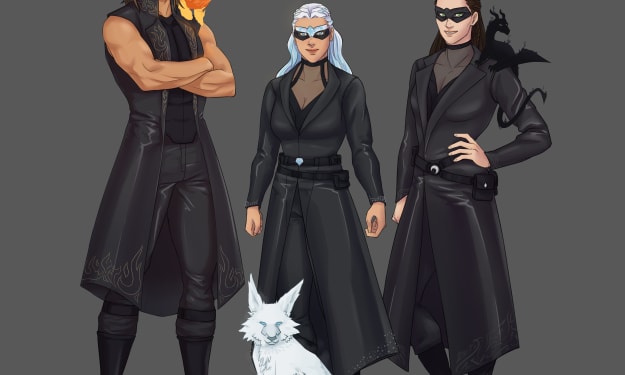Safehouse: Part 1 of The Journey
Between the dangerous and the unknown, there lies safety

There had been people here, once.
That was what the legends claimed, at least, but it had been a long time since there was anyone able to speak the truth of legend, either.
Now, all that remained was a ramshackle old barn on the near-endless plains, and the old woman who ran it as the last safehouse before the Wastes, and the Sanctuary that lay beyond them.
Safehouses were few and far between, and the old barn was the best we’d come across in our long journey. The only building as far as the eye could see, set against a backdrop of perpetually grey skies and the twisted skeletons of what had once been metal structures. There would have been a farmhouse near the barn, in the before times, but it was long gone, lost to scavengers or disaster or torn down to use for building materials. All that remained of a once-thriving farmstead was the barn itself, a vegetable plot, and a small grove of trees, grown close to the barn to shelter them from the winds that never died.
Perhaps it was excessive for a single aging guardian, but the people who made it to the safehouse still needed to be fed.
The howling gales and cyclones that my parents spoke of in hushed whispers were rare, the world having stabilised from the climate chaos that marked the lives of my parents and grandparents. I’d never seen a ‘bushfire’, the raging infernos that lived on in history books and chilling silences, experiences too horrible for those who had lived them to speak of aloud. I’d never seen a coastline, though I had seen pictures, and I doubted that written descriptions of waves taller than the buildings they swallowed, capable of drowning entire towns, truly did Tsunamis justice.
The winds blew eternal, however, a hollow whistling sound that never stopped, and I imagined that I could hear the cries of ghosts, the whispers of past and future in the noise that never stopped.
Concerts were another thing of the past, but if I never heard a flute again, when our long journey ended in the Sanctuary, it would still be too soon.
I wondered if the old woman, who refused to give her name, had been alive when it happened - when the population of the world was decimated and communities shrank to tiny household bubbles and cities became concrete graveyards. Did she live through that, or did she, like so many others, grow up knowing only her parents and siblings? If she had siblings at all. With the reduction of resources, many families stopped at a single child.
It was rare, these days, to see siblings who were not the result of a multiple birth. Or children at all, really; with everyone so isolated, opportunities to meet someone who was not related to you were rare.
My parents and I were not the only ones taking shelter and seeking supplies before braving the Wastes, but even now, with personal space at a premium, we kept to our own small family groups for the most part. The exception was at mealtimes, where there was a large table for everyone to sit around. Socialising was not optional; you put up with other people's company, or you didn't eat.
We had been at the safehouse a week, the old woman holding court at the head of the table, stately and silent, when she spoke.
We all listened, because the old woman never opened her mouth unless she had something important to say. “You’ll move on tomorrow. I’ve had word that it will be your best chance to get through as unscathed as possible, and there will be more refugees coming after you.”
She stood up. "Children, come with me."

We gathered at her feet, next to a stockpile of bones and a giant wheel. She picked up a small knife and a piece of antler, and began carving. Her movements were smooth and hypnotic, matching the candace of her voice. "I tell you this story to save your lives."
I blinked, startled, and from the rustle of movement around me, I was not alone in my reaction. Her words echoed more of tradition than of danger, as though her opening were as common as 'Once upon a time..."
At least, that was what I hoped.
She waited for us to settle down, handing the completed carving to a random child and beginning another. "For as long as this barn has stood here, even before there was a safehouse, there has been an old woman here to guard those who sought shelter. We give up our names, our pasts and our futures for such a cause."
I had put it down to an aging population, but there had been an unusual number of older women who had given my family aid or direction along our way. Was there a network of trustworthy elders, or did this old woman speak in the singular? "The journey before you is perilous, though the destination is worth the risk. The Wastes hold many dangers, both visible and hidden, and even when you reach Sanctuary, you must remember that nowhere is a paradise."
I accepted the next carving, which could have been a pendant, a wide needle, or a weapon of last resort. A girl beside me shifted in her seat. "What should we watch for, revered Grandmother?"
They looked nothing alike, and the phrasing suggested a honourific, rather than family connection. The old woman picked up another piece of antler, frowning as she examined it, then selected another. "Wherever there are people, there will be some with more and some with less, and some who will try to keep those with less from gaining more, so that they can think themselves superior."
The next carving went to the girl who had spoken up, who began doing something complicated with her fingers and a length of yarn. "You have been isolated for a long time, and must learn to live and work with others. Humanity's strength is in community, something you will have had little exposure to. It will be your greatest asset, but you must work for it."
Nearly everyone had a carving at this point, and by some unspoken mutual agreement, we continued to sit in each other's silent company until the last child had been gifted theirs. Was this what community was like? Helping others and being helped ourselves? It didn't seem so bad.

We left early the next morning, travelling in a large group for the first time.
It took a lot of getting used to. There were more people to keep track of, but also more to share the chores and responsibilities. By starting now, perhaps we would have the kinks worked out by the time we reached the Wastes.

Thanks for reading part one of The Journey, my Summer Fiction Challenge series! Tune in next week for part two, "Temptation"...
About the Creator
Natasja Rose
I've been writing since I learned how, but those have been lost and will never see daylight (I hope).
I'm an Indie Author, with 30+ books published.
I live in Sydney, Australia






Comments (1)
Great storytelling. Very well done.